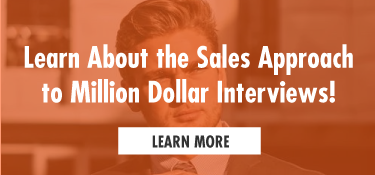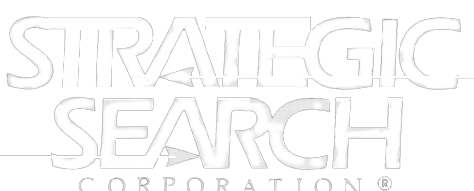Applying What You Learned
Slide #1
APPLICATION OF THE REAL BENEFIT EXERCISE
1. Winning First Impressions
2. How to ask Probing Questions
3. Eight Types of Interview Questions
We will begin with how to make a winning first impression.
First, The Wrong Way.
Interviewer: Hello Ed, how are you today?
Ed: Well, I’m alright I guess.
Interviewer: Okay
Scott: Bill what did you think?
Bill: He made a very poor first impression.
Scott: Exactly. He had a weak handshake, no eye contact and in general he was very unsure of himself.
Now, The Right Way.
Interviewer: Hello Ed.
Ed: Hello
Interviewer: How are you today?
Ed: I’m great. Thanks.
Interviewer: Good.
Scott: Now what did you think.
Bill: He had very good body language, firm handshake, good eye contact.
Scott: I agree and the key is these are all things that you can practice in your video tape session. The more you practice, the more you will improve.
Now we will show him how to ask probing questions
First the wrong way.
Ed: What are you looking for at ABC Company.
Interviewer #2: We want a good cost accountant.
Ed: Oh.
Consultant: Ed gave up too early.
Scott: He certainly did. And as we discussed earlier you need to Target your sales presentation to the interviewers needs. However, if you don’t know what the interviewers needs are you can’t do that. Ed needs to push for further clarification on what his interviewer’s needs are.
Now, The Right Way.
Ed: What are you looking for here at ABC Company?
Interviewer #2: We want a good cost accountant.
Ed: Well I definitely can appreciate that, but a good cost accountant means different things to different companies. What are the specific traits you are looking for here at ABC company?
Interviewer #2: We want someone that has formulated and delivered innovative tax planning and savings strategy. Also we need someone who has implemented both MRP and Erp systems lastly we need a person who is current and on top of financial software packages such as Cost Now.
Consultant #1: Here Ed pushed for more information.
Scott: Precisely. And if he needed even further clarification, he should push for that as well. Remember in order to sell effectively, you need to pinpoint your customers needs this is a skill you can easily Master in your practice interviews.
Finally, in this section we will show you how to answer some of the most common interview question. however, because there are literally thousands of questions the interviewer can ask you, there is no way that you can determine exactly which question you are going to be asked. Instead a more important strategy is to master The Real Benefit Exercise and then any question will be easier to answer.
Slide #2
EIGHT TYPES OF INTERVIEW QUESTIONS
1. Tell me about yourself
2. Strengths and weaknesses
3. Skill questions
4. Illegal questions
5. Behavioral questions
6. Negative questions
7. Salary questions
8. Projection questions
Tell Me About Yourself
First, The Wrong Way
Interviewer: So tell me about yourself
Ed: Well, I went to school here in Chicago, public schools, then I got my BS degree in accounting and then my MBA degree also in accounting and auditing. And then I got a job with an insurance company, ABC insurance then um, then I worked in the accounting department. That’s about it.
Interviewer #1: OK
Bill: He talked in terms of facts and not benefits.
Scott: Correct. And there was no depth to his answers. On top of that, an open ended question like this is a perfect opportunity for you to sell yourself as a solution to the hiring company’s needs. Ed failed to do this.
Now, The Right Way.
Interviewer #1: So tell me about yourself.
Ed: Well, I attended public schools here in Chicago. I received a BS degree in accounting and also an MBA in tax accounting and auditing. I took my first job with a firm called ABC Insurance Company. There I was responsible for cutting costs by over 20%. And after that I took a job with a company called Manis Gray as a tax manager. I was responsible for hiring and mentoring and developing 18 tax assistants. Also during the time I was there, I developed a program called the Cost Now Program. This program ended up saving the company nearly $37,000 during the first month of its implementation. Do you think this would be valuable to your company?
Interviewer #1: Definitely. That is exactly what we need. We’re looking to expand the department as well as bring in new technology.
Bill: That was very powerful. He applied both the mantra sell, sell, sell and the mantra numbers, numbers, numbers.
Scott: Precisely. He also used examples and even applied a trial closing at the end.
Strengths and Weaknesses
First, The Wrong Way
Interviewer #1: So tell me your strengths and weaknesses
Ed: Well I really don’t like working with other people. I prefer to work alone and sometimes I say things that get me in a bit of trouble. I am a good family man, though and I did work at my last job for over 15 years.
Interviewer #1: That doesn’t sound like you are a very good team player.
Ed: No, I rather work alone.
Interviewer #1: OK um. Any other strengths or weaknesses?
Ed: Well, I um I work with my hands. I do model airplanes at home.
Interviewer #1: OK
Scott: The purpose of the interview is not to be brutally honest about yourself. and it’s a sell yourself as a solution to the hiring company’s needs.
Bill: Exactly and also Ed should have shared a lot more examples of his strengths. Including examples of how each relates to the interviewer’s needs. The one example he gave us with using his hands to build models was really no relevance to this job. He needs to focus on job related strengths and minimize the talk of his weaknesses. And if he happens to mention a weakness he just has to remember to apply the caveat from caveat #6. Admit it, defuse it and turn it around.
Scott: I agree. And once again, if you do bring up any weaknesses, make sure you minimize them quickly and turn to your strengths by selling as much as possible.
Now, The Right Way.
Interviewer #1: So tell me your strengths and weaknesses.
Ed: Well my five greatest strengths are that I’m a CPA with both industry and public accounting experience. Which means that I am well versed in both internal and external reporting issues. I have developed long range product line sales plans, income statements, balance sheets and financial models for venture capital investors.
Interviewer #1: Ah
Ed: This means that if you launch a new product line with your company I will be able to easily handle all aspects. I’m also very strong in computers and I have implemented 22 software packages for my past employers and clients. This means that I will keep you on the cutting edge of technology.
Interviewer #1: Excellent. What about your weaknesses?
Ed: Well, I feel that one of my strengths is also one of weaknesses. I tend to be brutally honest in some situations.
Interviewer #1: Like at your last job where you were fired?
Ed: Yes. I was let go because I shared the truth about the situation instead of trying to camouflage the problem. However, many others of the company stand behind me and will offer me a great recommendation. Like right here I got a couple John Henderson, my previous boss or Mike Barnes who is the former general manager. Therefore this is actually a strength because I really believe that honesty is the best policy. Even if it makes me look bad, I would rather tell the truth. Is this an important trait for your company, Heidi?
Interviewer #1: Absolutely, we definitely want people to tell the truth, speak their minds and bring your level of skills to the organization.
Bill. Much better. He started off by saying he had five strengths even though he only had a change to list three before the interviewer cut him off. He also listed a lot of examples including using the visual clue of showing Heidi the note book of references.
Scott: And he remembered the formula, admit it, defuse it and turn it around when Heidi brought it up about him being fired. On top of all that he engaged a trial close to see where her interest level was.
Skill Questions
First, The Wrong Way
Interviewer #2 Can you explain your role in implementing starvaine toxley at Mathers Gray?
Ed: Yes, I was part of the team that developed the internal procedures.
Scott: Laurie, what are your thoughts?
Laurie: Ed only listed facts he did not come up with any specific benefits of his work.
Scott: Exactly. He only said that he was part of a team. He didn’t say what his specific role is. Next time he needs to remember to sell, sell, sell.
Now, The Right Way.
Interviewer #2: Can you explain your role in implementing starvain toxley at Mathers Gray?
Ed: Well, I designed all internal memos, certifications and procedures for the company. I also trained 18 junior accountants on how to advise their clients. Because of this process we finished the project 23 days ahead of schedule and saved the company over $410,000 in direct labor costs due to not paying any overtime or any outside consultants. Could this be of value to your company?
Interviewer #2: Definitely. You sound like a man of action and a big cost cutter.
Scott: In this example Ed shared his roles and also gave specific examples of his work.
Laurie: And ended with a trial close.
Illegal Questions
First, The Wrong Way
Interviewer #2: Aren’t you divorced?
Ed: Yes, but we are thinking of getting back together.
Laurie: This is an illegal question and you may not want to work for a company that asks questions like that. But as Scott discussed in his Fifth Caveat of Interviewing, you want to learn how to skillfully dodge an illegal question.
Scott: That’s true, Laurie. And to help you remember the most common illegal questions I have created the acronym SACCRO. That’s S A C C R O. That stands for sex, age, color, creed, religion and country of origin. These are definitely off limits. However, if you encounter an interviewer that either does not know the law or is blatantly disregarding the law you want to delicately dodge the question. But under no circumstances should you answer a question like that.
Now, The Right Way.
Interviewer #2: Aren’t you divorced?
Ed: Well, that’s an interesting question, but I don’t see how it’s relevant to this position.
Interviewer #2: It’s because all of our partners are good family men with stable home lives.
Ed: Well, I still think it is inappropriate and it may even be illegal for you to ask.
Interviewer #2: Sorry.
Ed: That’s OK.
Laurie: That was a lot better. And Ed artfully dodged the question the first time and even the second time when the interviewer kept pushing.
Scott: Absolutely. The key to handling such an illegal question is to practice the technique that I shared with you in the Fifth Caveat of Interviewing.
Behavioral Questions
First, The Wrong Way
Interviewer #1: If I spoke to some of your former bosses what would they tell me about you?
Ed: Well, I guess they would say I am OK. You know I really don’t know.
Interviewer #1: How about some of the people who reported to you? What would they say about you?
Ed: Well, they probably would say I am a pretty good guy. I hope they would say I was a good manager.
Scott: This is an example of an increasingly popular technique called the behavioral question. At it’s core is to uncover such psycological traits as management ability and teamwork. Also because it is an open ended question it allows you the opportunity to sell yourself as a solution to the hiring company’s needs.
Bill: Unfortunately Ed missed his chance. He also seemed unsure of himself which sends the wrong message to the interviewer.
Now, The Right Way.
Interviewer #1: If I were to talk to your former bosses what would they tell me about you?
Ed: They would tell you that I am a great cost cutter. During my 15 years at Mathers Gray I had several accomplishments. I reengineered various departments, I took four companies public and I implemented 22 new software programs. For example the Cost Now Program saved the company $3.7 million in 2003 and $5.9 million last year. Would these be important to your firm?
Interviewer #1: Absolutely. You sound like a big time cost saver.
Ed: Yes. And I welcome the opportunity to do this for your firm.
Scott: This was a text book answer. He used the opportunity to sell himself including employing a lot of examples and benefits to the interviewer.
Bill: And he ended with a very good trial close.
Negative Questions
First, The Wrong Way
Interviewer #1: Why were you fired from Mathers Gray?
Ed: My boss had it out for me ever since I blew the whistle on him.
Scott: Unfortunately Ed did not remember caveat #8 which is never talk badly about others.
Bill: He also forgot to sell himself.
Now, The Right Way.
Interviewer #1: Why were you fired from Mathers Gray?
Ed: Mathers Gray is a fine firm and I had 15 very good years with them, but my last boss and I did not see eye to eye. But I have some very good references including my former boss, John Henderson. He had some very nice things to say about me. Also, I implemented many cost saving programs while at Mathers Gray including the Cost Now Program. This program saved the company $3.7 million in 2003 and $5.9 million last year. Would these be important to your firm?
Interviewer #1: Absolutely. I am very impressed.
Scott: Perfect. He remembered the formal admit it, defuse it and turn it around. He even added a trial close at the end.
Bill: And he did not bad mouth his former boss.
Salary questions
First, The Wrong Way
Interviewer #2: What type of salary are you looking for.
Ed: Oh I am looking for at least a 10% increase over what I was making at Mathers Gray.
Interviewer #2: You were at $80K there so that means you are looking for $88K?
Ed: On no my rock bottom is $90K.
Scott: As I taught Ed earlier you should never make a specific demand for money at the first interview. Also you should not list an amount on the employment application.
Consultant #2: That’s because whatever you seek will either be too high or too low. If it’s too high you will knock yourself out of contention for an excellent opportunity. If it is too low you’ll
cheat yourself out of some extra compensation. The best answer is to always to say I am open on the money, the key is the opportunity.
Now, The Right Way.
Interviewer #2: What type of salary are you looking for?
Ed: I’m open on the money. The key is the opportunity.
Interviewer #2: What exactly does open mean to you?
Ed: I was at $80k at Mathers Gray and I would hope that you would pay a salary commensurate
with this position.
Interviewer #2: So you’re willing to work for $80K?
Ed: Mr. Myles, you have a very fine company here and I would definitely like to be considered for the position, but I’m not quite clear yet about the job expectations. So before I answer that question I would like to find out more information about the job and what you’re looking for in your company.
Scott: That was textbook. Ed stayed open on the money despite several attempts by David to push him on a specific amount.
Consultant #2: Employers will often try to push you into an answer. You have to resist this. The best answer is to say I’m open on the money the key is the opportunity. And stick to this no matter how hard they push you.
Projection Questions
First, The Wrong Way
Interviewer #2: Where do you see yourself in 5 years?
Ed: Well, I definitely hope to have a job and maybe even here with your company.
Scott: Ed didn’t sell at all.
Consultant #2: And he stumbled through his answer.
Now, The Right Way.
Interviewer #2: Where do you see yourself in 5 years?
Ed: Mr. Myles, in 5 years I hope to still be working here for your fine company and have advanced several times due to my cost cutting procedures and techniques. As you saw on my resume I implemented many cost cutting techniques at Manners Gray. For example the cost now program. It saved the company over $3.7 million in 2003 and $5.9 million last year. As you can see I am an expert in cost cutting and I’ll do everything I can to scrape a penny off the bottom line. Do you think this would be of value to your company?
Interviewer #2: Definitely. You sound like a man of action and a big cost cutter.
Scott: He did a good job of selling including listing examples and even adding a trial close at the end.
Consultant #2: He also targeted Mr. Myles’ company by making the statement that he’d leave no stone unturned in order to find cost effective strategies for his company.



